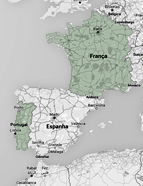

The collected correspondence regarding the SPHC focuses on the years 1947 and 1948. However, references to this project can still be found in 1951, the year in which Magalhães Godinho informed Fernand Braudel of the imminent publication of the first issue of the Bulletin d'Histoire de la Civilisation, requesting some introductory words from Braudel, E. Labrousse and Lucien Febvre for this journal sponsored by the Institut Français au Portugal. However, in 1953, the Bulletin d'Études Historiques was indeed published, sponsored by the institute, but no reference to the SPHC was to be found on its pages. Despite their known affiliation with the Annales, the contributors to this single issue of the Bulletin were not entirely aligned with the founding members of the SPHC - only the names of Joel Serrão, Barradas de Carvalho, Rui Grácio and Borges de Macedo appear. Thus, it may be assumed that the end of the SPHC dates back to 1953.
A series of history conferences held between 1951-52 on the premises of the IFP were featured on pages of the Bulletin d'Études Historiques. In addition to Magalhães Godinho, Borges de Macedo, Joel Serrão and António José Saraiva, Jaime Cortesão, who was visiting Portugal after a long exile, also attended these conferences, which was met with celebration by the opposition circles (Seara Nova, nos. 1270-71, Jan. 1953; Soares, Portugal gagged, 1974, p. 47).
In the late 1980s, Magalhães Godinho claimed that not only had the authorities not allowed the legalization of the SPHC, but they had also pressured the IFP to stop sponsoring these conferences (Godinho, Do ofício e da cidadania, p. 59).
From an analysis of his PIDE [International and State Defence Police] file, it is known that these conferences were monitored by the political police, with the respective identification of the attendees and the content of the papers. In the paper presented by Magalhães Godinho in October 1951, on "Economic history and political history", the undercover agent noted the presence of some communist activists, as well as criticism of the absence of O Capital and of Marx in his speech. However, he observed that this presentation had been exclusively restricted to the scientific and scholarly domains, without any political or ideological allusions.
